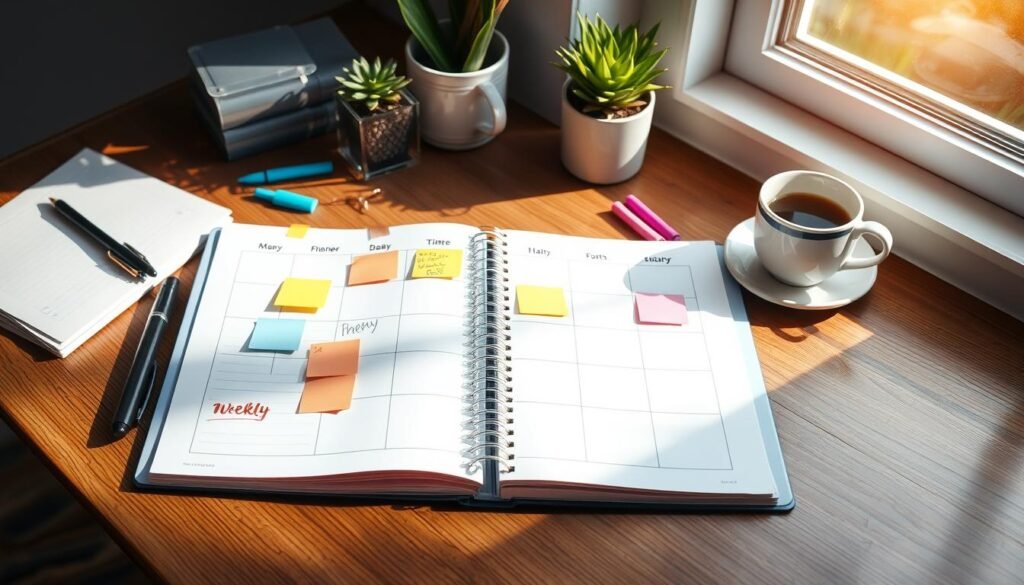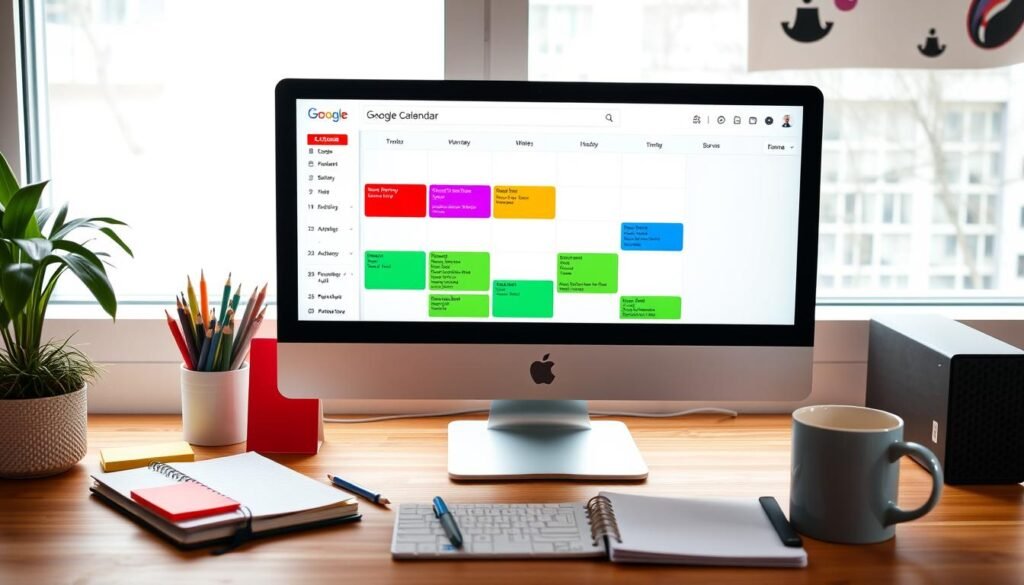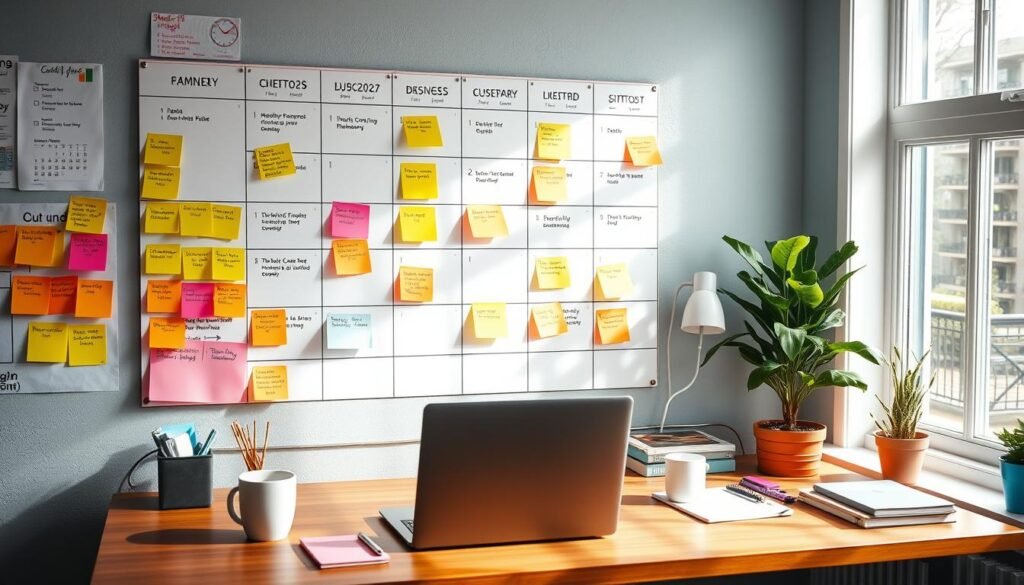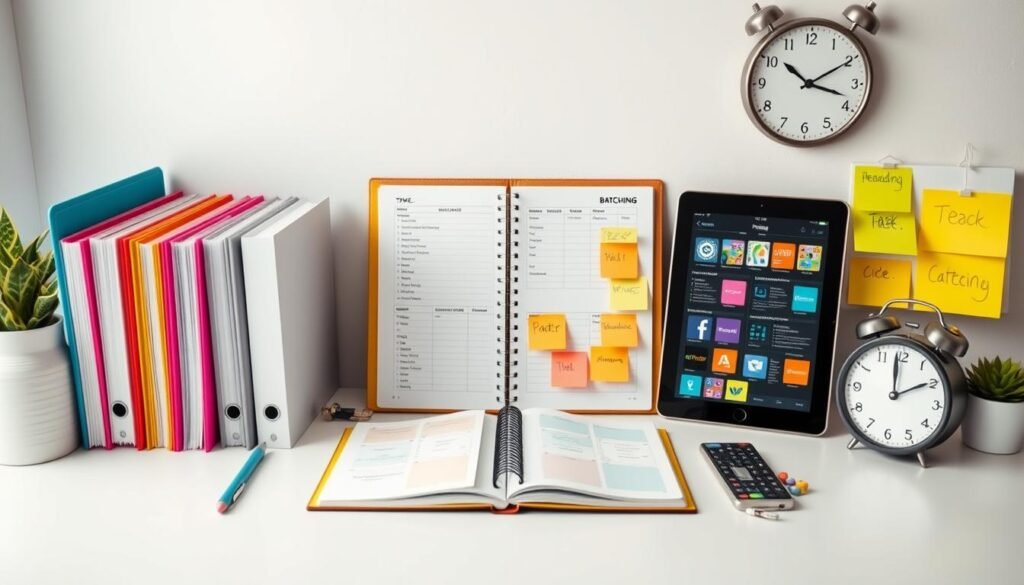How to Set Up a Weekly Planning System to Boost Productivity
Some links on this page are affiliate links. This means we may earn a commission at no additional cost to you if you click through and make a purchase. Thank you for your support!
Starting a new week can feel like a big challenge. But, there’s a simple way to take back control and boost your productivity. Welcome to the world of weekly planning, a game-changer for work and life.
I’ve used a weekly planning system for years to stay ahead. It’s a moment of clarity in a busy world. By planning just a bit on Sundays, I focus on what’s important, reduce stress, and get more done than I thought possible.
A good weekly plan is more than a to-do list. It’s a roadmap to success. It helps us see our goals, tackle urgent tasks, and make sure we have enough time and resources. Plus, anyone can learn it, no matter their job or life situation.
Key Takeaways
- Weekly planning is a powerful productivity tool that can help you achieve more in less time.
- Dedicating just 30-60 minutes on Sundays to plan your week can set you up for success.
- A structured weekly plan helps you prioritize tasks, manage your time, and stay focused on your goals.
- Incorporating calendar management and time blocking into your weekly planning system can further boost your productivity.
- Developing sustainable weekly planning habits can lead to long-term success and a more balanced, fulfilling life.
Understanding the Power of Weekly Planning
Starting a weekly planning routine can change how we work and live. It helps us organize our days and weeks better. This leads to less stress, better time use, and more focus on important things.
Benefits of Structured Planning
Breaking tasks into a weekly plan helps us manage our work better. We can handle only what’s doable each day. This makes us more productive and feel accomplished as we finish tasks.
Impact on Work-Life Balance
Weekly planning lets us see both work and personal life clearly. We can plan time for important tasks and for fun. This balanced approach improves our work-life balance.
Psychology Behind Effective Planning
Good planning is about setting clear goals and feeling in control. A weekly routine motivates us to do our tasks. This boosts our sense of achievement and outlook on productivity.
Weekly planning unlocks more productivity, better balance, and control over time. Adopting this practice can help us reach our full potential and achieve our goals.
Weekly Planning Productivity: Essential Components
Creating a good weekly planning routine is key to being productive. Just 30 minutes to an hour each week can set us up for success. It involves reviewing projects, setting goals, managing our calendar, and staying flexible.
First, we should look at our active projects and goals. This helps us focus on the most important tasks. We can then plan our week using a prioritization matrix.
Financial tracking is also crucial. By monitoring our income and expenses, we can manage our money better. This helps us make smart decisions about how to use our resources.
Habit tracking is another important part. It helps us keep track of activities like sleep, reading, and exercise. Reviewing our habits weekly helps us stay on track with our goals.
Managing our calendar and time is also key. We need to balance fixed commitments with time for deep work and learning. This balance is vital for a healthy work-life balance.
By focusing on these key areas, we can boost our weekly planning productivity, task prioritization, goal setting, and time management. A structured approach helps us confidently tackle the week and reach our goals.
| Key Components of Weekly Planning | Purpose |
|---|---|
| Projects & Tasks | Review active projects, prioritize tasks, and ensure alignment with goals. |
| Financials | Monitor weekly transactions, such as income and expenses, to manage finances effectively. |
| Events & Meetings | Review upcoming appointments, meetings, and events to ensure availability and preparation. |
| Habits & Routines | Track personal development activities, such as sleep, reading, and exercise, for consistent improvement. |
| Learning & Development | Set learning goals, such as reading, listening to podcasts, or taking online courses, to facilitate continuous growth. |
By spending time on these key areas, we can unlock the power of weekly planning productivity. This makes achieving our personal and professional goals easier and more efficient.
“The key to winning the week is to plan the week.” – The Winning The Week Formula
Creating Your Weekly Planning Foundation
Building a strong weekly planning foundation boosts your productivity and helps you reach your goals. It’s about picking the right tools, setting up a good planning space, and using time blocking effectively.
Choosing the Right Planning Tools
Start by picking the right tools for your weekly planning. You might like a digital planner like Notion or a physical one. Choose based on what you like and how you work best. Look at things like how easy it is to use, if you can customize it, and how it feels to use it.
Setting Up Your Planning Environment
Your planning area is key to a good weekly plan. Pick a spot that’s quiet and free from distractions. Make it comfy, bright, and have all you need like a notebook, pens, and digital tools.
Establishing Time Blocks
Time blocking means setting times for different tasks. This helps you manage your energy and focus on important tasks. Try out different block sizes and setups to see what works for you.

“By planning ahead, we reduce stress, allowing for a calm and confident start to the week. Time blocking and grouping similar tasks increase our productivity, enabling us to complete more in less time.”
For a great weekly planning foundation, balance structure and flexibility. Keep checking and adjusting your plan to match your changing needs and goals.
The Sunday Strategy: Preparing for Success
As the weekend ends, planning for the week ahead is key. The Sunday Strategy is a powerful routine. It helps us regain control and start the week with purpose.
One big plus of the Sunday Strategy is it reduces stress and anxiety. By spending just 30 minutes reviewing our projects and goals, we feel ready for the week. This feeling of control boosts our confidence and focus.
The Sunday Strategy is more than planning; it’s about self-care too. People who plan on Sundays tend to be more productive and balanced. It lets us make time for activities that improve our health, like meal prepping and exercise.
Research shows many people like to plan on Sundays. About 60% of our audience does this. Around 70% use grocery delivery services, and 50% do laundry on Sundays. Also, 40% of people exercise on Sundays.
By using the Sunday Strategy, we can have a productive and fulfilling week. It’s about reviewing our plans, prioritizing tasks, and taking care of ourselves. This simple routine can change our lives for the better.

So, as Sunday comes, let’s take a deep breath and start our planning. It’s time to increase our productivity, clarity, and well-being.
Mastering Calendar Management and Time Blocking
Effective calendar management and time blocking are key to boosting productivity and balancing work and life. By using your google calendar with task management tools, we can optimize our schedules. This helps us stay on top of our priorities.
Google Calendar Integration Tips
Syncing your google calendar with project management apps and to-do lists creates a central hub. This makes it easier to plan your time. Use calendar optimization features like color-coding and event notifications to keep your schedule organized.
Balancing Fixed vs. Flexible Time Blocks
Time blocking helps structure our days, but we need a balance. Set aside time for deep work, meetings, and personal tasks. Also, leave room for unexpected demands and spontaneity. This balance keeps us productive and adaptable.
Managing Multiple Calendars
Managing multiple calendars, like work, personal, and family, can be tough. But, by planning all commitments weekly, we avoid conflicts. Use calendar integration and color-coding to manage different aspects of life in one google calendar.

“Time blocking can help optimize working hours by focusing on similar tasks grouped in a single block, improving efficiency and productivity.”
Mastering calendar management and time blocking unlocks our full potential. It helps us achieve a better work-life balance and control our schedules. With digital tools and a balanced approach, we can thrive and reach our goals sustainably.
Prioritizing Tasks and Goals Effectively
In our quest to boost productivity, the art of task prioritization and goal setting is key. By knowing which tasks are urgent and important, we can direct our time and effort to what really matters.
The Eisenhower Matrix is a powerful tool for sorting tasks. It divides tasks into four areas: urgent and important (do now), important but not urgent (plan), not important but urgent (delegate), and not important and not urgent (drop). Using this method helps us focus on the most impactful tasks and delegate or eliminate less crucial ones.
- First, find your important tasks that match your long-term goals and priorities. These tasks drive real progress, even if they’re not urgent right now.
- Then, handle your urgent tasks that need quick action. But don’t let them take over your week at the cost of your important work.
- Use task batching and the “Eat the Frog” technique to tackle tough tasks first. Do this when you’re most energized and focused.
- Regularly review and adjust your priorities during your weekly planning. This keeps your daily and weekly tasks in line with your long-term goals.
By prioritizing tasks and goals with purpose, you’ll unlock sustained productivity and meaningful progress towards your dreams.
“The key is not to prioritize what’s on your schedule, but to schedule your priorities.”
– Stephen R. Covey
Effective task prioritization is crucial for a successful weekly planning system. By focusing on your most important and impactful tasks, you’ll use your time and energy wisely. This leads to greater success in both your work and personal life.

Implementing the Weekly Review Process
“What gets measured, gets managed.” The weekly review process helps us reflect on our progress and make needed changes. It keeps us on track with our goals and boosts our productivity.
Evaluating Progress and Achievements
The weekly review starts with looking back at the past week. We ask ourselves what worked and what didn’t. This helps us learn and plan better for the next week.
Adjusting Plans and Priorities
With insights from our review, we adjust our plans for the next week. We focus on what’s important and tackle challenges. This makes our plans flexible and effective.
Planning for the Next Week
Finally, we plan for the week ahead. We check our calendar and tasks to make sure we’re ready. This helps us start the next week with clarity and purpose.
The weekly review doesn’t have to take a long time. In fact, a 30-minute review is often the most effective. This habit can greatly improve our productivity.
| Weekly Review Checklist | Purpose |
|---|---|
| Capture any new tasks or commitments that have arisen from your emails. | |
| Calendar | Review your calendar to identify any follow-up actions or upcoming commitments that require attention. |
| Desktop/Downloads | Tidy up your digital workspace, ensuring important files and information are organized and accessible. |
| Notes | Review your notes and brainstorming sessions from the past week, identifying any key insights or action items. |
| Tasks | Evaluate your task list, prioritize upcoming actions, and identify any tasks that need to be added or rescheduled. |
By regularly doing this weekly review, you’ll be closer to reaching your goals and keeping a good balance between work and life.

Maximizing Productivity Through Task Batching
Task batching is a key to boosting productivity. It involves grouping similar tasks together. This makes our workflow smoother and more efficient.
Studies show that switching tasks can be costly. It takes 23 minutes to get back on track after an interruption. Multitasking can lower our IQ, and switching tasks can cut productivity by up to 40%.
Task batching helps avoid these problems. It means setting aside time for tasks like emails or content creation. This reduces the need to switch between tasks, saving time and mental energy.
By batching tasks, we can work more efficiently. It helps us avoid the stress and frustration caused by constant interruptions. Task batching makes our days more structured, boosting productivity.
Combining time blocking with task batching is a great strategy. It helps us focus on tasks without distractions. The GTD method can help organize tasks by effort or project.
Task batching also helps us meet deadlines and avoid burnout. It reduces distractions, allowing for a better work-life balance. This technique is a game-changer for productivity and focus.
By using task batching, we can achieve more in less time. It’s a powerful tool for anyone looking to improve their productivity and time management. Incorporate it into your routine to unlock your full potential.

Developing Sustainable Planning Habits
Building consistent planning habits is crucial for long-term success. It’s not about creating the perfect system right away. Instead, focus on creating a routine that fits naturally into your work life. Start with simple steps and gradually add more complexity as you get used to it.
Building Consistency
Consistency is key to lasting planning habits. Set aside a specific time each week to plan. It could be Sunday evenings or Monday mornings. Stick to it.
Begin with short planning sessions and grow them as you become more comfortable. Remember, it’s better to be consistent than to try too much too soon.
Overcoming Common Planning Challenges
Procrastination is a big obstacle in planning. Fight it by setting clear goals and breaking them down into smaller steps. Reward yourself for sticking to your plan. This positive feedback helps solidify the habit.
Also, be open to changing your approach if needed. A flexible mindset helps you overcome common challenges.
Maintaining Long-Term Success
To keep your planning habits going, regularly check and tweak your system. See what works and what doesn’t, and make changes. Stay open to new methods and tools that might boost your productivity.
Most importantly, celebrate your wins, no matter how small. Recognizing your progress keeps you motivated and helps you build on your success.
Creating lasting planning habits is vital for long-term success. Start small, tackle challenges, and keep improving your system. This will make planning a natural part of your work life. Enjoy the journey and see how your productivity habits improve your career and personal life.
ALSO READ: How to Stay Focused on Your Goals Beyond January
Tools and Resources for Enhanced Planning
Looking to boost your productivity and make weekly planning easier? The right tools can help a lot. There are many digital planners and task management apps out there. Let’s look at some top picks to help you reach your goals faster.
Notion is a favorite among productivity fans. It’s an all-in-one workspace for managing databases, planning, and more. It’s great for organizing work and personal life in one place.
ClickUp is another top choice for task management. It lets you set priorities, due dates, and work with your team. Its easy-to-use design and device syncing make it a key tool for planning.
A good calendar is essential for planning. Google Calendar is a top pick for managing your schedule. It helps you keep track of events and time blocks. Plus, it works well with other Google tools.
Digital planners are also popular for planning your week. They come as PDFs or digital files and help you organize tasks and goals. Look for ones that fit your style and work with your tools.
Choosing the right planning tools is important. Try out different options and see what works best for you. With the right tools, you can make your weekly planning more efficient and organized.
“The key is not to prioritize what’s on your schedule, but to schedule your priorities.” – Stephen Covey
ALSO READ: 5 Morning Affirmations to Boost Your Motivation in 2025
Conclusion
Using a weekly planning system can change how we work and live. It helps us reach our goals in both life and work. By planning well, we can manage our time better and do more.
Being consistent and flexible is key to good weekly planning. Begin with simple steps and improve as you go. Celebrate each small win to boost your planning skills.
Let’s start this journey of better planning together. Learn from each step and keep improving. This way, we can reach our full potential and make every week count.
ALSO READ: How to Cultivate a Growth Mindset in the New Year
FAQ
What are the benefits of structured weekly planning?
Structured weekly planning has many benefits. It reduces stress and improves time management. It also boosts productivity and focus, helping you achieve your goals. It ensures you don’t overload yourself with too many tasks each day.
How does weekly planning impact work-life balance?
Weekly planning helps balance work and personal life. It gives you a clear view of your priorities. This leads to better motivation and control over your time and tasks.
What are the essential components of weekly planning productivity?
Key components include reviewing projects and goals, setting weekly priorities, and checking appointments. Organizing tasks and keeping some flexibility in your schedule are also important. Make sure to leave room for unexpected tasks and emergencies.
How can I choose the right planning tools for effective weekly planning?
Choosing the right tools is crucial. You can use digital tools like Notion databases or physical planners. Create a dedicated space and time for planning. Also, set aside specific times for different tasks.
What is the Sunday Strategy for weekly planning?
The Sunday Strategy prepares you for the week. It involves reviewing projects, setting priorities, and organizing your to-do list. This approach helps you start the week focused and productive, reducing stress.
How can I effectively manage my calendar and use time blocking for productivity?
Managing your calendar and using time blocking are key to productivity. Google Calendar can be linked with task management tools for smooth planning. Balance fixed appointments with flexible time blocks for structure and flexibility. Consider all your calendars during planning to avoid conflicts.
How do I prioritize tasks and goals effectively?
Effective prioritization means distinguishing between urgent and important tasks. Use the Eisenhower Matrix to sort tasks. Align daily tasks with long-term goals for steady progress. Review and adjust priorities weekly to stay focused and achieve big goals.
What is the weekly review process, and why is it important?
The weekly review looks back at the week’s achievements and challenges. It helps evaluate progress and adjust plans for the next week. This ensures your plans stay aligned with your goals and adapt to changes.
How can task batching improve my productivity?
Task batching groups similar tasks for better efficiency and focus. It saves mental energy from switching tasks. Use it in your weekly planning to organize your days more effectively and increase productivity.
How can I develop sustainable planning habits for long-term success?
Building consistent planning habits is essential for success. Start simple and gradually add complexity to your planning. Overcome procrastination by setting clear goals and rewarding yourself. Regularly review and adjust your planning to stay motivated and successful.
What tools and resources can I use to enhance my weekly planning process?
Use productivity tools and apps to improve your planning. Notion, ClickUp, and Google Calendar are popular choices. Digital planners offer flexibility and integration with other tools. Find the right combination that fits your style and needs







